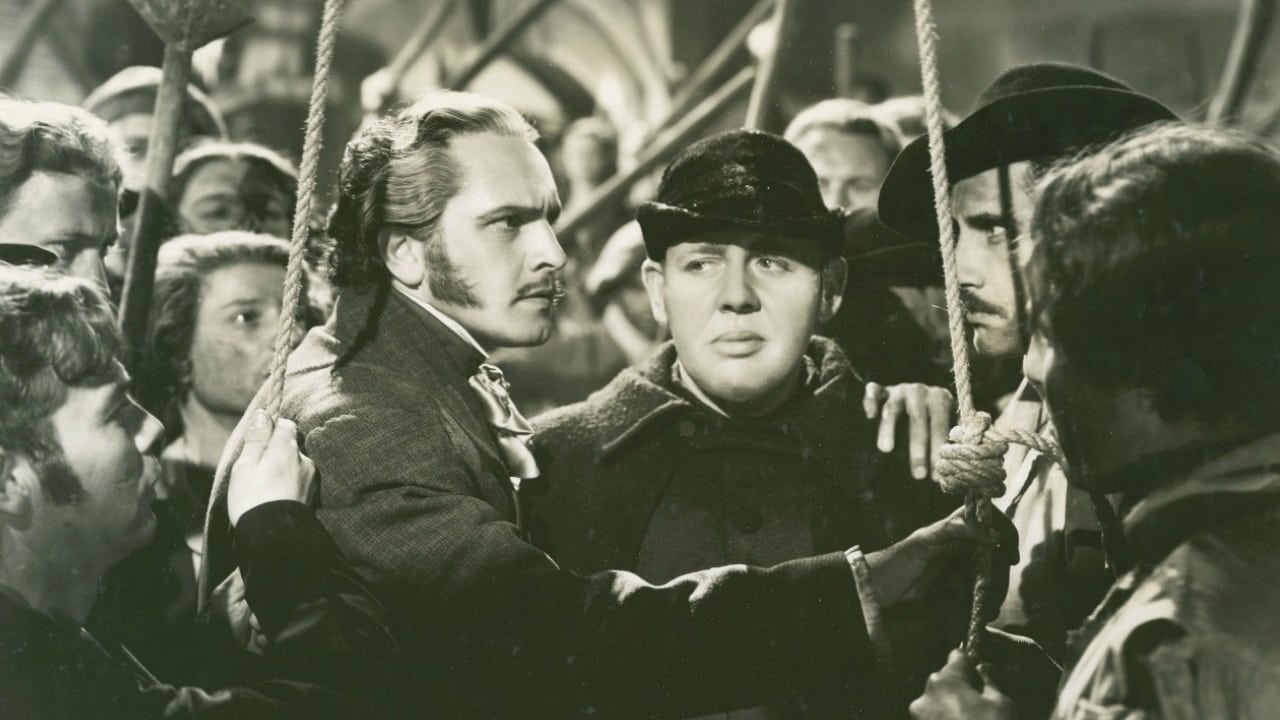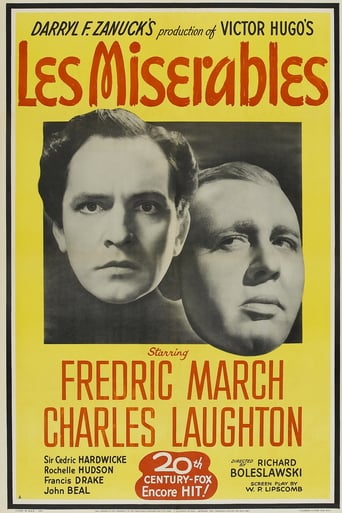Livestonth
I am only giving this movie a 1 for the great cast, though I can't imagine what any of them were thinking. This movie was horrible
PiraBit
if their story seems completely bonkers, almost like a feverish work of fiction, you ain't heard nothing yet.
Robert Joyner
The plot isn't so bad, but the pace of storytelling is too slow which makes people bored. Certain moments are so obvious and unnecessary for the main plot. I would've fast-forwarded those moments if it was an online streaming. The ending looks like implying a sequel, not sure if this movie will get one
Erica Derrick
By the time the dramatic fireworks start popping off, each one feels earned.
TheLittleSongbird
Les Miserables, with its rich and powerful narrative and mostly compelling characters, is deservedly a classic. It is also not an easy book to adapt, because of how rich in detail it is and its mammoth length. This 1935 film is one of the best and most accessible of Les Miserables(which has been adapted several times with mixed results). Adpaptation-wise, it is not word for word-we are looking at a very long film or mini-series, which was literally unheard of around that time, that way- and condensed(some might say it guillotines the text, but that seems to me too harsh and violent a word to use), but it does do a great job still and the spirit of the book still remains. It does deserve to be judged on its own merits, as do most adaptations, and on that front Les Miserables(1935) succeeds brilliantly. It is a very lavish and authentic production, of all the film adaptations it is one of the best-looking. Alfred Newman's score has that stirring and haunting touch, it has his distinctive style yet it fits the tone of the film ideally. The script is very literate and thoughtful and the story still is powerful, I am in complete agreement that there is the sense also that Valjean doesn't find goodness to be easy despite his nobility. The climax is ironic and hugely emotional, apparently Charles Laughton himself said that it was "the finest thing I have ever been able to accomplish on the screen", some could argue that but with others(including myself) it is very easy to see why. It is skilfully directed and paced in a way that doesn't feel as though it's rushing through the narrative nor that it plods. The chase in the sewers is thrilling. The performances are very good, Frances Eldridge is a moving Fantine, John Beal is likable as Marius, Frances Drake's Eponine is loyal and empathetic and while Cosette is one of the least well-developed characters of the book Rochelle Hudson is charming and sympathetic, careful not to let her delicate looks overshadow her acting(easy to do and a lot of Cosettes have fallen into that trap). The leads are the ones that dominate. Fredric March is very well cast as Valjean, bringing out his nobility and character conflict, that he's handsome too is a bonus. Even more impressive is Charles Laughton, who is effortlessly obsessive and menacingly commanding but he does manage to reign in and not resort to hamminess too much, Javert's conflict has been more convincing elsewhere but there is still the realisation that he can't get what he's been pursuing for so long without going against what's he's stood for(and the realisation also that he cannot accept that Valjean has really changed after thinking him an immoral man for so long) and it still convinces. In conclusion, brilliant film. 10/10 Bethany Cox
kidboots
Once the production code became rigidly enforced in 1934 gangster movies were out (for a few years anyway) and family entertainment was in. While "Les Miserables" was not exactly a Victorian romance it was a classic novel and the studios were turning to them in droves. Even poor old Monogram had rolled out "Jane Eyre" with Colin Clive as a special production.There are not enough superlatives to describe Charles Laughton's blistering performance - has that man ever put an acting foot out of place. Along with dynamic Frederic March the film told a thorough but certainly condensed version of Victor Hugo's gripping narrative of the deplorable justice system that once existed in France.When Jean Valjean (March) is sentenced to ten years on the galleys for stealing a loaf of bread, he meets his nemesis Captain Javet (Laughton) an over bearing despot who was born in prison and sees everybody divided into two classes - the law makers and the law breakers. Valjean endures and sees much inhumanity during his 10 year term but feels, when finally released, that his sentence is only beginning as with his yellow passport he is stamped a felon and no one will give him a chance. All except a saintly priest (Cedric Hardwicke) who has the reputation of never turning any begger away from his door. Hardened by years of ill usage Jean is caught stealing the silverware by the authorities but not only does the priest claim he gave it to Jean, he berates Jean for forgetting to take the candlesticks with him. The first kindness Jean has been shown in over 10 years and the candlesticks play a big part in his redemption.Now five years later as Monsieur Madeleine he is manager of a thriving factory and is soon to become Mayor of the town and he also runs into an old "friend" Captain Javet, who has been appointed the town's new chief of police. When a misunderstanding at the factory throws a woman, Fantine (Florence Eldridge, March's real life wife) out of work, Jean moves heaven and earth to bring Fantine her little child, Cosette (Marilyn Knowlden), who even though only 8 is working as a kitchen hand. It also causes Javet to have doubts about Jean's real identity.When a man who has stolen apples is identified as Valjean and the real Valjean speaks up for him at his trial to ensure he won't be sent to prison, the chase between the two protagonists begins in earnest. Laughton is magnificent as the quite mad Javet, whose lips tremble and gives forth platitudinous jargon such as "the law is the law"!! Several times Valjean has him in his power but his strong sense of decency and right cause him to release Javet. Those acts push Javet over the edge to insanity. There is quite an exciting chase between Javet and Valjean, who has fled with little Cosette in a pony cart and from then on Valjean is only one or two steps ahead of his enemy.The now grown Cosette (Rochelle Hudson) has left her convent and she now becomes involved with a young revolutionary student, Marius, (John Beal). There is of course another young lady, Eponine (lovely Frances Drake) who looks as though she could start plenty of trouble. The stage is now set for a thrilling chase through the sewers as the older Valjean carries the wounded Marius on his back to safety and Cosette.Rochelle Hudson should have had a career like Madge Evans, she was delicately beautiful and 1934 culminated in two of her most prestigious films, "Imitation of Life" and "Les Miserables", but after that, unfortunately, it was all down hill and her decent roles (in "Poppy" and "Show Them No Mercy") were few and far between. Beautiful, dewy eyed Frances Drake also seemed to be a casualty of 1935 - she had her biggest hits during that year - "Les Miserables", "Mad Love" and "The Invisible Ray" and then no more. Not forgetting little Marilyn Knowlden, an exquisite looking child who played exquisite children eg Kim in "Showboat". Apparently she told the story of her father who took a day off from his law practise to see if he could get his much complimented daughter into the movies. It only took a day and her "mini" movie career was born.
disdressed12
not having read the classic novel by Victor Hugo,i can't comment on how faithful this film was to the source,but as for the film itself,i found it simply brilliant.the acting is superb all around,but Fredric March as Jean Valjean and Charles Laughton as Javert,are stellar.the story itself is very well written and directed.redemption is the main theme and and that is illustrated very powerfully on more than one occasion,none more so than the last scene,in my opinion,although there is a certain amount of irony as well.in short,i loved this film,and would highly recommend it those who have a taste for classic cinema.for me,Les misérables is a perfect 10/10
jamesmmahoney
This 1935 version of "Les Miserables" is perhaps the finest film ever produced during Hollywood's golden age. Highlighted by superb acting from three of the greatest English-speaking actors ever to appear on film (March, Laughton and Hardwicke), a superb script and outstanding production values, this 20h Century Fox production has more than stood the test of time. Now released on DVD, it is available for modern audiences to view and compare to other filmed and staged versions of this classic Victor Hugo tale. Even now, 73 years after it was filmed, it never fails to move the viewer with its extraordinarily powerful narrative. A not-to-be-missed film from Hollywood's Golden Age!

